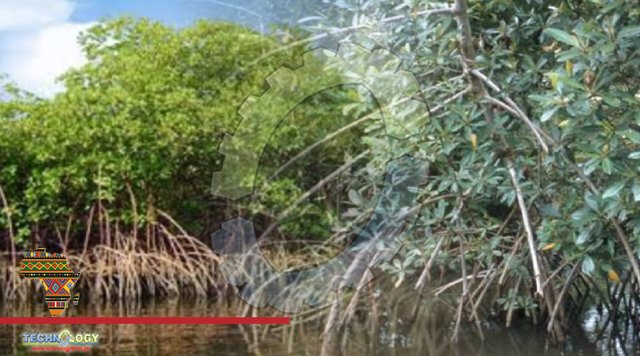Faced with little or no attention from the authorities after decades of devastating oil pollution, residents are replanting mangroves destroyed over the years.

Oil pollution , During her childhood days in Rivers State, Martha Agbani had the pleasure of living in a coastal community in the Ogoni area, where the vegetation seemed pristine. But with the passage of years, as oil spills from pipelines criss-crossing the Niger Delta spewed crude into the waters, the mangroves began to disappear. People like Ms Agbani find life less meaningful without the presence of the mangroves that sheltered fishes, crustaceans and other aquatic lives that had not only fed the local population but had been the heart of a robust trade for fishermen and resident traders.
A United Nations study released in 2011 revealed it would take 25 to 30 years to remediate, restore and clean up Ogoniland. Six years later, Ms Agbani began a regeneration effort that would help the region restore the part of vegetation that was lost. She runs the Lokiaka Community Development Centre, an advocacy backing indigenous women farmers in maintaining the natural state of the environment and protecting the green space. She began researching, visited institutions for capacity building and also engaged institutions with expertise in reforestation-related fields. In 2018, Ms Agbani visited several oil polluted communities in the region like Kpean, Kwawa, Baen, Kono, Bere, Gure and Bodo. However, Yaataah was more promising in accepting the idea of restoring the environment.
Oil pollution, More than 50 oil wells are located in Yorla Oilfield – one of many in Yaatah Community – some of which are quite close to homes in rural settlements in Ken-Khana, all in Ogoniland. Mostly terrestrial, the oilfield has a patchy sort of regenerated vegetation, crowded by herbs, shrubs, and sparse trees. Because of the magnitude of her vision, Ms Agbani couldn’t work alone. She assembled a group of indigenous women for that purpose; they would be compensated also. With women empowerment in mind, the composition of that team was one hundred percent female.
So far, one million trees have been replanted in the community. Ms Agbani and her team sell mangrove nurseries to companies including Shell who themselves are involved in reviving lost environments. Her first experience in 2018 was a false start as many of the plants did not survive. She said the plants were not given adequate space during cultivation and that adversely affected the growth. ” Majorly (there) has been paucity of funding (and there have been) unemployed community youths violently disrupting our activities and threatening our lives and the project mistaken for HYPREP/Federal Government initiative which has financial benefits,” Ms Agbani highlighted the challenges. Her centre gets support from donors like Global Green Grants Fund and a donor-advised fund from Tsadik Foundation supervised by Global Green Grants itself. Recently, her centre received financial assistance from Cultural Survival to plant about 10, 000 mangrove pods.
Source: This news is originally published by allafrica